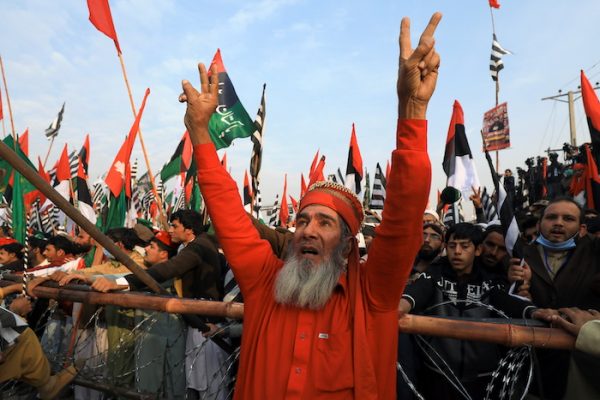Pakistan must rein in the ‘three evils’ through good governance if CPEC is to ever take hold.
Pakistan has long struggled as a perpetrator and victim of the first evil, terrorism. Last month’s decision by the United Nations Financial Action Task Force to retain Pakistan on the grey list for failing to dismantle terrorist financial infrastructure, despite repeated warnings, is indicative of Islamabad’s inconsistent approach to countering terrorism.
Pakistan’s blasphemy law remains a key challenge to securing religious freedom for the country’s religious minorities, and in combatting the second evil, extremism. These laws have been used to persecute and unfairly target minority faiths. A decision to introduce major reforms in the curriculum of over 30,000 madrassas as part of a strategy to dismantle extremist networks has lacked unwavering determination.
The decades-long insurgency by ethnic Balochs for an independent Balochistan constitutes the third evil, separatism. With abysmal quality of life indicators, prolonged neglect, repression, and exploitation of its resources, Pakistan’s largest and most impoverished province holds the key to the success or failure of CPEC. Balochistan is home to the Gwadar seaport, a deep-water access point to the Arabian Sea that is crucial to China. Stability in the province remains elusive as the marginalised Balochs fear population displacement and environmental degradation as corollaries to CPEC.
Rising anger among local communities, who believe that CPEC’s economic benefits will flow solely to the state, lends sustenance to the Baloch insurgency. Cooperation between China and Pakistan against the ‘three evils’ has emboldened Pakistan to intensify its massive campaigns of harassment and enforced disappearances of dissenters. Islamabad’s hawkish view of rebels broadly converges with China’s concerns about the ‘three evil’ forces to quash ethnic-based struggles in the region.
Islamabad’s assurances of improving security in response to China’s concerns about the ‘three evils’ during the formal launch of CPEC in April 2015 saw Balochistan become the focus of Pakistan’s military-focused counter terrorism priority. Pakistan established a special security division comprising 15,000 paramilitary forces to protect the large numbers of Chinese engineers and workers engaged to work in the province.
Demonstrations since October 2020 by 11 opposition parties decrying Prime Minister Imran Khan’s military-backed government are gathering momentum. The protesters are targeting the all-powerful military and the CPEC Authority Chairman, a retired general. These attacks reflect a growing unease with the military’s influence on the elected government and will further harm CPEC’s progress.
Pakistan’s security outlook is the worst it has been in at least three decades. With the tools of China’s smart city technology at its disposal, the temptation for Pakistan to respond to the ‘three evils’ is to opt for a replication of the Xinjiang ‘security state’ in Balochistan. The use of artificial intelligence to profile minorities in China and the surveillance of minority Muslims in southern Thailand with Chinese technologies portend this future. Beijing’s new envoy to Pakistan — a political appointee groomed in trade and religious issues — further signals intent towards surveillance.
China’s dominance in the internal affairs of Pakistan continues to grow. Islamabad dismisses the greatest repression of Muslims in the 21st century as a ‘non-issue’. China’s crackdown on Uyghur women married to Pakistani men and the trafficking of over 600 Christian minors as brides to China have barely created a ripple in Pakistan’s politics. The abandonment of Pakistani students in Wuhan was greeted with silence.
But there remains some recognition in Pakistan about the perils of becoming a Chinese vassal state. Anti-Chinese sentiment is rising, leaving Pakistan at a crossroads regarding its approach to the ‘three evils’ and appeasing China or challenging it with good governance.
Pakistan’s approach has been mainly military-focused and misses the enormous potential for good governance. Pakistan must consider how to include all of society. The recent grant of a stay by an international tribunal on a US$5.8 billion penalty imposed on Pakistan for denying a lease to an Australian company to access the Reko Diq mines in Balochistan provides Pakistan an opportunity to consider a good governance approach and to reach out to marginalised insurgents as a strategy for reducing the ‘three evils’.
It is imperative for Pakistan to be inclusive in its effort to resolve the Baloch conflict. The opportunity to address legitimate and genuine grievances through an inclusive and accommodative governance model is clearly at hand. The recent death of the powerful cleric Khadim Rizvi, who championed himself as the custodian of blasphemy laws, offers Islamabad an opportunity to take control over the narrative of blasphemy as a critical issue in its domestic politics.
As the international community grows wary of lending further support to Pakistan, CPEC appears to be the last of its opportunities to drive the country toward development and modernisation. Ridding itself of the ‘three evils’ through a good governance approach would be a good place to begin.
Shyam Tekwani is Professor at the Daniel K Inouye Asia-Pacific Center for Security Studies.
The views expressed in this article are the author’s own and do not necessarily represent the views of APCSS, the US Department of Defense or the US government.


“Setbacks to the China–Pakistan Economic Corridor (CPEC) continue to mount,…”, anyone who has traveled to Pakistan recently would beg to differ with this melodramatic opening pitch. The power is back on with very few brown-outs. The multi-lane, controlled-access motorway now form a physical spine of CPEC from Thakot to Khuzdar – only 2 gaps are left at the periphery. Gwadar port is operationalized with transit trade, Gwadar airport (GWD) is on track to open in 2022. Diamer-Bhasha Mega Dam is on track to be completed by 2028. What are the set backs? Spin must have some basis in truth.